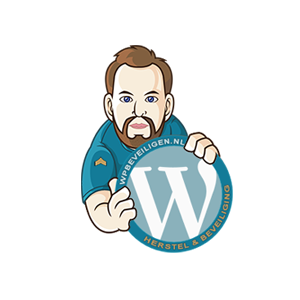Is WordPress security really necessary?
<span style=”font-size: 16px;”>WordPress security may seem unnecessary for many website owners because, after all… millions of websites are built with WordPress, right?! Does that mean they’re all insecure? Read now whether WordPress security is necessary or unnecessary for your WordPress websites.</span>
<h2>WordPress itself is secure</h2>
WordPress itself is kept incredibly secure and up-to-date by a team of professionals. WordPress itself is not a security risk as long as you keep it updated!
The problem lies in the plugins…
<h2>The plugins</h2>
The plugins pose the risk. The plugins are created by different individuals, and not everyone has received a high-level education as a programmer.
As more plugins are used, the risk increases that mistakes are made in the code.
<h2>Hackers</h2>
Hackers are constantly searching for ways to infect websites with malware, advertisements, and primarily links to their own products or services. This is called black-hat SEO.
<h2>The question again, is WordPress security necessary?</h2>
This depends on the number of plugins you use. If you use 3 and keep them up-to-date, your website won’t be at much risk.
But if you use 10, 20, 30, or even 40 plugins… yes, then you need to take certain measures to prevent hackers from easily gaining access.
<h2>Managing security yourself or outsourcing?</h2>
You can manage security yourself or outsource it. Whether you manage it yourself or outsource it depends on several factors:
<strong>Securing your WordPress website yourself</strong>
If you have a simple informational website.
If you use a few plugins, maximum 5-8.
If you keep them well updated.
If you use strong passwords.
If you don’t give access to your website to just anyone.
If you have a security plugin like iThemes Security OR Sucuri OR WordFence installed.
If you have a good web host.
Then this can work fine for years without problems or malware.
<strong>Having your WordPress website secured by professionals</strong>
Do you have an online shop? Do you offer services and products? Do you have a contact form, quote form? In short, do people fill in important information on your website?
Are you heavily dependent on your website for income? Do you have a reputation to maintain?
In short, are you a medium-sized company?
In that case, it’s best to have your WordPress website professionally secured.
The cost of a hack, of a damaged Google reputation, outweighs the relatively small monthly amount you pay for the security and maintenance of your website.
Have your website secured and maintained, and by security and maintenance, we mean:
<ul>
<li>Controlled updates – Periodic and immediate for known vulnerabilities</li>
<li>Professional security – Through a good firewall, good configuration</li>
<li>Monitoring – User activity, messages, uptime</li>
<li>Recovery guarantee – No costs if a vulnerable plugin causes problems</li>
<li>Backups – Daily backup to an external data vault</li>
<li>Question and answer – Technical support</li>
<li>Debugging – In case of plugin or theme conflicts</li>
</ul>
Request security and maintenance for your WordPress website now!
<a class=”btn btn-green” href=”https://wpbeveiligen.nl/beveiligen-type-website”>Request</a>


 [sluit-inn]
[sluit-inn]
 No, most web developers create websites. Web developers focus on design, content, and, in the best case, they install and configure a free security plugin.
No, most web developers create websites. Web developers focus on design, content, and, in the best case, they install and configure a free security plugin.